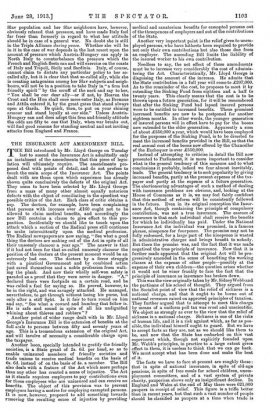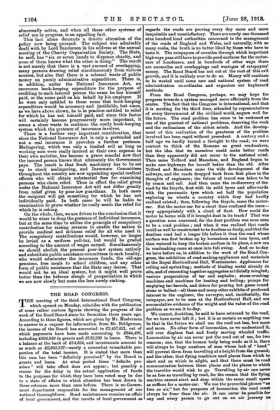THE INSURANCE ACT AMENDMENT BILL. T HE Bill introduced. by Mr.
Lloyd. George on Tuesday last to amend the Insurance Act is admittedly only an instalment of the amendments that this piece of legis- lation will ultimately require. The amendments pro- posed deal with points of detail, and do not profess to touch the main scope of the Insurance Act. The points dealt with are those upon which experience has already shown quite conclusively the defects of the original Act. They seem to have been selected by Mr. Lloyd. George from a mass of many other almost equally notorious defects with the object of conciliating in the speediest way possible critics of the Act. Each class of critic obtains a sop. The doctors, for example, have been complaining that persons with incomes over £160 ought not to be allowed to claim medical benefits, and accordingly the new Bill contains a clause to give effect to this pro- position. Incidentally we should like to touch upon the attack which a section of the Radical press still continues to make intermittently upon the medical profession. The Radical newspapers are now saying, " See what a good thing the doctors are making out of the Act in spite of all their unseemly clamour a year ago." The answer is that if it had not been for that so-called unseemly clamour the position of the doctors at the present moment would be an extremely bad one. The doctors by a fierce struggle with a piratical Government and by combined action just saved themselves and a noble profession from walk- ing the plank. And now their wholly self-won safety is paraded as a proof that they were never in danger. "A." declared there were footpads on a certain road, and he was called a fool for saying so. He proved, however, to be in the right, and was savagely attacked. He managed, nevertheless, to get through without losing his purse, but only after a stiff fight. Is it fair to turn round on him and say, " See what a coward and humbug that fellow is. He is safe and sound in spite of all his undignified whining about thieves and robbers " P Another point of wider range dealt with in Mr. Lloyd George's Insurance Bill is the extension of benefits at the full scale to persons between fifty and seventy years of age. This is a tremendous extension of the original Act, and will involve of necessity a considerable charge upon the taxpayer. • Another boon, specially intended to gratify the friendly societies, is a State grant of 2s. 6d. per head, so as to enable uninsured members of friendly societies and trade unions to receive medical benefits on the basis of 6s. 6d. instead of on the basis of 4s. a member. The Bill also deals with a feature of the Act which more perhaps than any other has created a sense of injustice. The Act as it stands requires employers to pay contributions even for those employees who are uninsured and can receive no benefits. The object of this provision was to prevent employers having a motive for employing exempted persons. It is now, however, proposed to add something towards ramoviug the resulting sense of injustice by providing medical and sanatorium benefits for exempted persons out of the threepences of employers and out of the contributions of the State.
Another very important point is the relief given to unem- ployed persons, who have hitherto been required to provide not only their own contributions but also those due from an employer. The amending Bill limits the liability of the insured worker to his own contribution.
Needless to say, the net effect of these amendments must be to increase very considerably the cost of adminis- tering the Act. Characteristically, Mr. Lloyd George is disguising the amount of the increase. He admits that the State contribution in a full year will come to £207,000. As to the remainder of the cost, he proposes to meet it by extending the Sinking Fund from eighteen and a half to twenty years. This clearly means that the cost is to be thrown upon a future generation, for it will be remembered. that after the Sinking Fund had lapsed insured persons were to be entitled to increased benefits. These promised increased. benefits are now to be postponed for another eighteen months. In other words, the younger generation of insured persons will in effect have to pay for the boons now extended to the older generation. Apparently a sum of about £350,000 a year, which would have been employed for the purposes of the Sinking Fund, is to be diverted to meet the increased benefits provided in the Bill, so that the real annual cost of the boons now offered by the Chancellor of the Exchequer is over £550,000.
Instead of attempting to criticise in detail the Bill now presented to Parliament, it is more important to consider what is the general tendency of this measure and to what conclusions it probably, indeed we fear almost inevitably, leads. The general tendency is to seek popularity by giving increased benefits, partly at the present expense of the tax- payer and partly at the expense of a future generation. The electioneering advantages of such a method of dealing with insurance problems are obvious, and, looking at the House of Commons as it is, we may feel fairly confident that this method of reform will be consistently followed in the future. Even in its original conception the Insur- ance Act, though containing the principle of compulsory contribution, was not a true insurance. The essence of insurance is that each individual shall receive the benefits for which he individually has paid. Under the National Insurance Act the individual was promised, in a famous phrase, ninepence for fourpence. The promise may not be fully redeemed, for a large part of the ninepence is wasted in administrative charges and brings benefit to nobody. But there the promise was, and the fact that it was made negatived the true principle of insurance. Now that it is further made apparent that the original Act will be pro- gressively amended in the sense of benefiting the working classes at the expense of other people—possibly at the expense of their own children—the question arises whether it would not be wiser frankly to face the fact that the principle of insurance as insurance has broken down. This was the view originally taken by Mr. SidneyWebb and the partisans of his school of thought. They argued from the Socialist point of view that the relief of sickness is a national charge, and that it ought to be borne out of national revenues raised on approved principles of taxation. They further argued that to attempt to meet this charge by means of a uniform poll tax was cruel and unscientific. We object as strongly as ever to the view that the relief of sickness is a national charge. Sickness is one of the risks of human life, and it is a risk against which, as far as pos- sible, the individual himself ought to guard. But we have to accept facts as they are, not as we should. like them to be, and now that the State has embarked on this vast experiment which, though not explicitly founded upon Mr. Webb's principles, in practice to a large extent gives effect to them, it is useless to think that we can go back. We must accept what has been done and make the best of it.
The facts we have to face at present are roughly these : that in spite of national insurance, in spite of old-age pensions, in spite of free meals for school children, unem- ployment committees, and of a vast system of private charity, pauperism shows only an insignificant decline. In England and Wales at the end of May there were 621,000 paupers in receipt of relief. This figure is a trifle better than in recent years, but that such a vast number of people should be classified as paupers at a time when trade is
abnormally active, and when all these other systems of relief are in progress, is an appalling fact.
This fact alone demands a drastic alteration of the policy now being pursued. The subject was admirably dealt with by Lord Sanderson in his address at the annual meeting of the Charity Organization Society. The State, he said, has " six or seven hands to dispense charity, and none of them knows what the other is doing." The result is not merely that there is a vast amount of overlapping, many persons drawing relief simultaneously from various sources, but also that there is a colossal waste of public money on purely administrative expenditure. There is, in addition, under the National Insurance Act, an enormous book-keeping expenditure for the purpose of crediting to each insured person the sums he has himself paid, or the sums paid on his behalf by his employer. If he were only entitled to these sums that book-keeping expenditure would be necessary and justifiable, but since, as we have above shown, he is in practice entitled to relief for which he has not himself paid, and since this factor will certainly become progressively more important, it seems a sheer waste to continue the costly book-keeping system which the pretence of insurance involves. There is a further very important consideration, that since the National Insurance Act is only a pretended and not a real insurance it provokes a further pretence. Malingering, which was only a limited evil as long as working men were really insured at their own expense in their own societies, has become a grave scandal now that the insured person knows that ultimately the Government pays. The result is that fresh machinery has to be set up to check malingering, and Insurance Committees throughout the country are now appointing special medical officers who will obtain substantial fees for examining persons who claim relief. Thus in effect the relief given under the National Insurance Act will not differ greatly from relief given by poor-law guardians. In both cases the recipient will get something for which he has not individually paid. In both cases he will be liable to examination to prove whether he really needs the relief for which he is asking.
On the whole, then, we are driven to the conclusion that it would be wiser to drop the pretence of individual insurance, but at the same time to utilize the principle of compulsory contribution for raising revenue to enable the nation to provide medical and sickness relief for all who need it. The compulsory contributions would, however, no longer be levied as a uniform poll-tax, but would be graded according to the amount of wages earned. Simultaneously we should abolish the present poor-law system entirely and substitute public assistance committees in each locality, who would administer the insurance funds, the old-age pensions, free meals to school children, and any other form of public assistance that the State may decree. That would not be an ideal system, but it might well prove better than the hideous slough of pauperization in which we are now slowly but none the less surely sinking.



























































 Previous page
Previous page